Contents
You can remove bitterness from milk mushrooms not only by soaking, but also in other ways. First of all, you should understand what is the reason for the bitter taste of mushrooms, and then it will become clear how to remove the unpleasant bitterness.
Why mushrooms are bitter
Milk mushrooms are edible or conditionally edible mushrooms. They are used in salting and pickling, added to boiled soups and even fried. But it is this mushroom species that has a characteristic unpleasant feature – raw milk mushrooms are bitter, and often an unpleasant taste persists even after processing.
The reason is that a large amount of milky juice is present in the raw pulp. It not only gives the mushrooms a bitter taste, but also causes the light mushroom flesh to darken when broken, sometimes even after processing. As long as the milky juice soaks into the pulp of the fruiting body, it will be bitter.
That is why milk mushrooms belong to the category of mushrooms that require careful and long processing during cooking. There are no toxic compounds in their composition, but if you neglect the preparation, the finished dish will turn out to be tasteless, because there will be too much bitterness in it.
Interestingly, sometimes even after processing, the fruiting bodies continue to taste bitter – this means that the algorithm was violated, and the milky juice could not be completely removed. It is customary to wash bitter pickles with water, and if an unpleasant aftertaste is felt in boiled or fried mushrooms, it remains only to put more spices and seasonings in the finished dish.
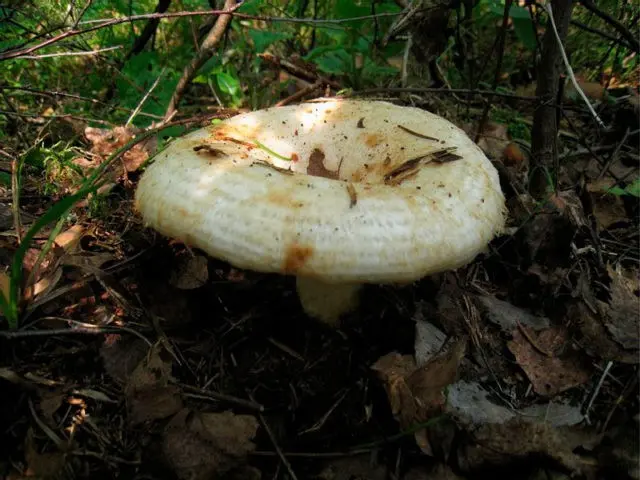
The bitter taste in mushroom bodies is due to the presence of milky juice.
What to do so that milk mushrooms do not taste bitter
There are proven ways to remove unpleasant bitterness from the pulp. First of all, immediately after harvesting, mushrooms must be thoroughly cleaned of dirt – brush off forest debris and remnants of the earth, remove rotten places and trim the lower part of the legs.
Before processing, the mushroom catch must be washed in cold water several times in a row.
- Soaking remains the classic way to remove bitterness from raw mushrooms. It takes a lot of time, but almost always gives the result – milk mushrooms become pleasant to the taste and also retain the light color of the pulp.
- To soak mushrooms from bitterness, it is necessary to keep them in water for 2-3 days, in less time the milky juice will not have time to leave the mushroom pulp.
- Water needs to be changed regularly, it is advisable to do this 3-4 times a day so that it does not stagnate and turn sour. If you soak the fruiting bodies in the same liquid, then there will be no benefit from this – in fact, the hats will remain in their own milky juice, and the bad aftertaste will not go anywhere. When changing the water, the fruiting bodies in the container are slightly pressed, draining the liquid to the end, and then poured with a fresh portion of water.
- Often, mushroom pickers are faced with the fact that when soaking mushroom caps float to the surface of the water, and the liquid does not completely cover them. This must be fought, the hats in this case are pressed down from above with a weighty oppression. If the water does not completely cover them, then it will not be possible to remove the bitterness, since the milky juice will remain in the part of the pulp that is not in contact with water.
Determining that the product is ready for further processing is very simple – you need to lightly lick the mushroom on the cut. If bitterness is no longer felt, then the milky juice has been removed, and the mushrooms are suitable for cold or hot cooking.
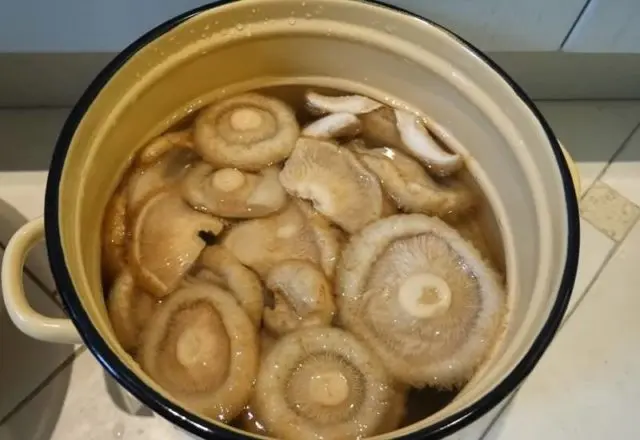
Long soaking removes the bitter taste completely
Another way to remove bitterness from mushrooms is boiling. Fresh peeled mushrooms are placed in a pot of salted water and boiled for 10 minutes, then the water is changed and the process is repeated. After boiling, the fruiting bodies must be thrown into a colander for at least half an hour so that the glass liquid is completely.
Sometimes you may encounter the fact that milk mushrooms are bitter after salting. This means that at one of the stages of processing the technology was violated, and the milky juice still did not completely leave the mushroom pulp.
Bitter pickles do not have to be thrown away immediately, you can try to save the mushrooms and remove bitterness from them:
- If salted mushroom caps are bitter, then the easiest way to remove an unpleasant aftertaste is to simply rinse the pickles thoroughly under cold water, and then season with sour cream and spices. According to gourmet reviews, the remnants of bitterness in this case go away.
- If the fruiting bodies are very bitter, you can drain the brine and hold the mushrooms in cold water for 1-2 days, and then salt them again, this time putting more salt.
In both cases, some effort will have to be made to remove the bitterness. However, this will help not to be completely without salted mushrooms.
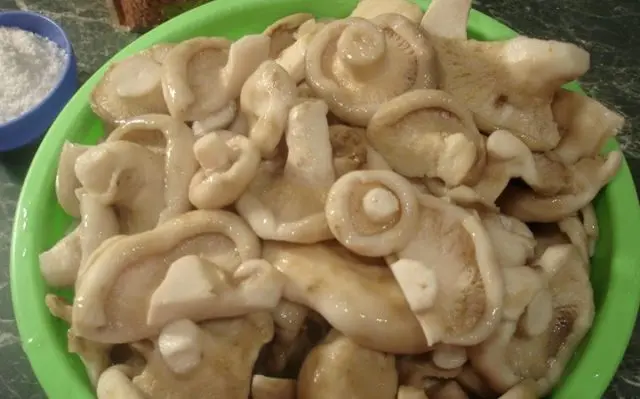
Pickles with unpleasant bitterness can simply be washed
How to remove bitterness from milk mushrooms without soaking
Soaking bitter mushrooms in water effectively removes the bad taste, but is quite a long process. Many would like to somehow speed up the process and remove the bitterness from the mushroom pulp in a couple of hours.
Unfortunately, it is impossible to do this without processing at all. The bitter taste depends on the presence of milky juice in the pulp, and the juice can only be removed with water.
But it is realistic to remove bitterness from white mushrooms without soaking for several days, an alternative is to quickly boil the fruiting bodies in salted water:
- During cooking, the milky juice leaves the mushroom pulp in the same way, only it can be removed faster than when soaking.
- To qualitatively remove the bitter taste, it is necessary to boil the mushroom bodies with salt for 10 minutes, then drain the water and replace it with fresh water, and then put the mushrooms back on the stove for the same time.
- In total, the procedure is repeated 3 times, each time changing the water in the pan and not forgetting to salt it. When following the rules, the fruiting bodies lose their unpleasant aftertaste and at the same time retain the white color of the pulp.
- When cooking, it is necessary to ensure that the water completely covers the fruiting bodies. If the caps protrude above the water, then bitterness may persist, since the processing will not affect the entire surface of the mushrooms.
The only drawback of this method is that the boiled milk mushrooms are then only suitable for frying, adding to soup or stewing. It is not customary to salt and pickle them, since boiled fruit bodies lose their pleasant elasticity and crunchiness.
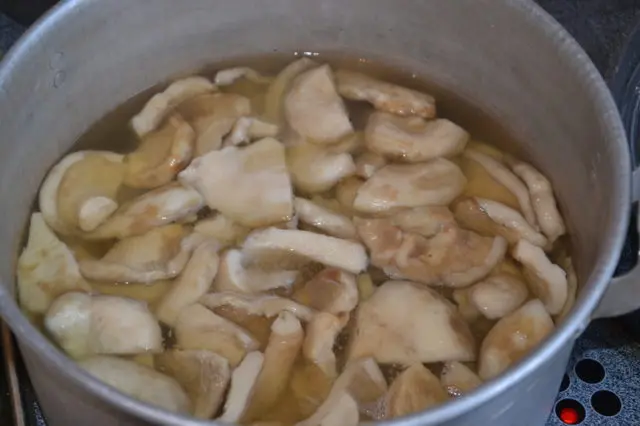
Cooking eliminates unpleasant tastes no less effectively
Practice shows that usually there is no need for digestion – it is possible to make mushrooms non-bitter much faster, and with prolonged heat treatment, the fruiting bodies boil too much.
Useful Tips
A few useful recommendations will help remove bitterness from mushroom pulp faster and more reliably:
- It is best to collect young mushroom bodies in the forest, their pulp contains less milky juice. Overripe fruiting bodies are always more bitter, and besides, in old specimens, by definition, there are more harmful substances collected by the fungus from the soil and air.
- Experienced mushroom pickers advise going for mushrooms on cloudy days after rain. Fruiting bodies collected in damp weather are less bitter, but those that have had time to dry in the sun lose a significant part of the moisture and have more bitterness.
- Yellow and white milk mushrooms are less bitter than dark varieties of the fungus. If you do not want to put too much effort to remove an unpleasant taste, then it is better to collect light-colored fruiting bodies.
- It is recommended to soak or boil the collected mushrooms immediately upon returning from the forest. If you leave them to lie in the air for several hours, then the mushrooms will have time to darken, dry out, and the bitterness in them will only intensify, respectively, it will be more difficult to remove it.
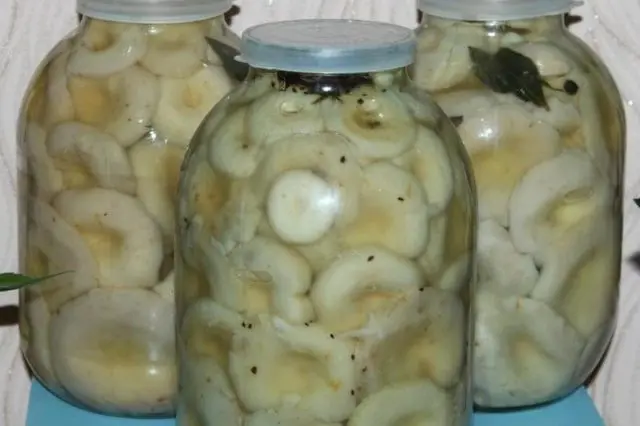
You can drown out the bitter notes in mushrooms with spices.
Conclusion
The best way to remove bitterness from milk mushrooms is with a long soak. But if the fruiting bodies are intended for soup or frying in a pan, you can do with boiling three times – the result will be exactly the same.









